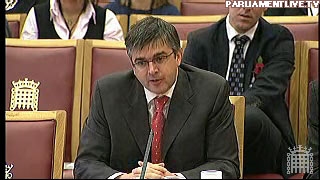
I’m not sure we learned a lot from this morning’s Lords Communications Committee session with Michael Ellam (the Prime Minister’s official spokesman) and Sir Gus O’Donnell (head of the home civil service), part of the continuing review of government communications, and reforms proposed in 2004’s Phillis Review. It wasn’t an intense grilling, and as you’d expect, it was deftly and professionally handled.
Perhaps surprisingly, the internet took immediate centre stage. Chairing the session in Lord (Norman) Fowler’s absence, Lord (Tom) King asked about the apparent doubling of government communications staff. You can guess the response which came back: difficulties of definition, 24/7 demands, more channels, new channels. It was this final point which was picked up by Mike Ellam, who noted the growth of Downing Street’s digital communications operation.
He took as an example the recent ‘Ask The PM’ exercises on YouTube: but it was particularly telling to note the language he and the Committee used. Members of the public asked questions ‘via webcast,’ said Ellam. Lord King checked what he meant – ‘on film?’ Well, er, technically no, but… When Ellam finally dared to refer specifically to YouTube, it seemed almost apologetic.
Asked if it had been worth doing, Ellam said he felt ‘anything that improves direct communications with the public has to be a good thing’; O’Donnell agreed, saying it was ‘good for society as a whole if we can increase engagement in the political process’, and this was one way to reach young people in particular. And since the PM was already being briefed weekly for PMQs, it was ‘not a great extra burden’ for him to answer questions on camera occasionally.
And that was that; things moved swiftly on to familiar matters of the Lobby system, impartiality, the role of special advisers. (Although Ellam raised the subject Robert Peston’s blog, in response to a question about off-the-record briefing, noting how Peston had quoted unnamed bankers as his sources.)
The morning’s proceedings had started with two ladies from the Citizens Advice Bureau, who were asked specifically about the ‘digital divide’ and their experiences with government websites. They were actually very complimentary about Directgov: Fiona (didn’t catch her surname) said she was ‘impressed with the presentation’, and praised its ‘accessible language’. She took a particular interest in search results, noting that DG offered a ‘meaningful list’, unlike many others. But Directgov had its shortcomings: it was quite fragmented, although she acknowledged that it might be a reflection of fragmented systems in government, and it lacked detail on ‘extent issues’ – namely, differences between England, Wales, Scotland and Northern Ireland.
They talked about their ‘complete dismay’ at the reduction of leaflets being made available in hard copy: if you went to a library to print off a 100-page document on employment rights, for example, it was ‘like buying War And Peace’; and with libraries charging per page printed, the cost could soon mount up. Interestingly, they noted that whilst 35% (ish) of people nationally didn’t have broadband at home, 70% of their customers fell into that group.
But if we’re going to talk about the Lords and technology… I can’t resist pointing you to the apparent death threat (in jest, presumably?) made by Radio 4 Today Programme presenter John Humphrys this morning, when Lord Desai’s mobile went off mid-interview. (Fast-forward to 6m30 for that familiar Nokia refrain.)
 There’s a new look to the
There’s a new look to the 